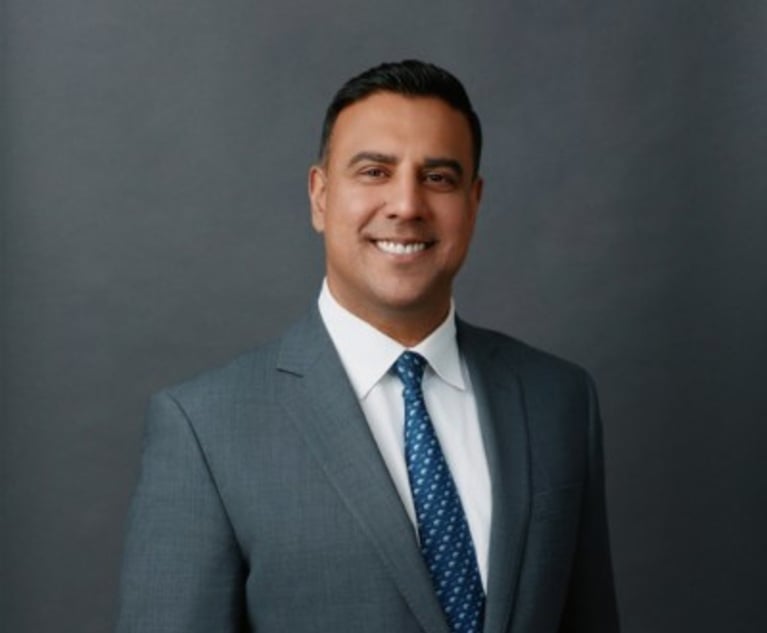Clifford Chance Looks to Australian Expansion
In an interview with Law.com, Australia managing partner Richard Gordon discusses the future of his firm and the outlook for Australia's legal market.
September 18, 2019 at 05:58 PM
6 minute read
 Photo: Diego M. Radzinschi/ALM
Photo: Diego M. Radzinschi/ALM
Despite a spate of departures in recent years, Magic Circle firm Clifford Chance expects to grow in Australia as it focuses on international clients and expands its disputes and private equity practices.
In an interview with Law.com, Clifford Chance Australia managing partner Richard Gordon said the firm is "having an incredibly successful year" and is looking to hire and promote lawyers in its two Australian offices in Sydney and Perth.
Like many foreign entrants into the Australian market, Clifford Chance is not a full-service firm. Instead, it is seeking to be "a premium international legal services provider", Gordon said.
The firm focuses primarily on three areas: large-scale disputes, particularly class actions and regulatory investigations; acting for domestic and international financial institutions in large-scale financing transaction needs; and private equity and private markets, particularly working for alternative asset managers, private equity funds and hedge funds.
Gordon said the global disputes and arbitration practice is "a huge area of growth" thanks to an upswing in regulatory investigations, including Australia's Banking Royal Commission, which is leading to more class action work.
 Richard Gordon
Richard GordonThe private markets and private equity practice is also growing, as more investors and corporations look to private markets over share markets.
"In Australia, there's been a huge amount of focus put upon the behaviour of ASX-listed companies, and there's a real dearth of capital markets issuances and IPOs," said Gordon, who specialises in financing transactions and spent 16 years at local firm Allens before joining Clifford Chance in 2015 and becoming managing partner two years ago.
"A lot of financial investors are putting money to work in private equity and private markets rather than the public market," he said. "Those firms that look after financial investors – whether it's in equity or in credit – are exceptionally busy, whereas those that focus on public M&A and equity capital markets are probably slightly less busy."
The firm was first established in Australia in 2011 by merging with small local firms Chang, Pistilli & Simmons in Sydney and Cochrane Lishman Carson Luscombe in Perth. Since then, several of the original partners have left, including Mark Pistilli and Danny Simmons who formed their own boutique firm in Sydney.
Despite Gordon's optimistic outlook, the Perth office has seen significant turnover. In June, partner Jennifer Hill and counsel Sean Houthuysen left; in May, global oil and gas group co-head Tracey Renshaw departed for DLA Piper's London office; and last October, former office head Paul Lingard joined Norton Rose Fulbright.
One partner who left the firm after the merger said there was a feeling among some lawyers that their local clients were no longer valued.
Gordon disagreed.
"I think we still retain a great blend of global and local clients," he said. "But what we are resolutely focused on is only working on the premium end of the market."
He noted that the local arm of the firm has become more international in focus since it first arrived in Australia, with partners and senior associates spending a lot more time in other offices of Clifford Chance.
"For example, I have a team of 15 people here, a number of whom are constantly working on matters that have got nothing to do with Australia and they might be working with a partner based in Singapore or Hong Kong," Gordon said.
Since the merger, some partners have decided that other platforms might be more suitable for them, but this would be the case at any global firm, Gordon said. "Yes, we have had some departures over the years, but the Perth practice as it's currently configured is doing exceptionally well."
The firm currently has two partners and 29 other fee-earners in Perth and 10 partners and 45 fee-earners in Sydney. Gordon said he plans to expand both offices with hires and promotions, but doesn't ever plan to be as large as King & Wood Mallesons, which has about 180 partners in Australia, or as big as Linklaters-aligned Allens, which has 139.
Overall, he said the firm is "having an incredibly successful year" and its Asia-Pacific region, which includes Australia, has seen 50% revenue growth during the past four years, compared with 25% for the global firm.
The market for legal services is "incredibly competitive", he said, and sophisticated clients are picking and choosing firms based on the individuals in the firms and their areas of expertise, rather than relying on a single firm.
"We're seeing an increasing level of sophistication and disaggregation of teams," Gordon explained. "Where we're going to be getting to over the course of the next few years is really a best-of-breed virtual team for a particular transaction that a client might want.
He added: "They're so discerning now that they might say: 'I don't want to use you for the real estate aspects of this transaction because I can get that done more cost-effectively by a terrific domestic firm. But what I do want from you is your cross-border M&A capability because what we're seeking to achieve on this transaction actually might have a financing requirement in Europe.'"
For instance, a transaction might have a tax aspect in Luxembourg that Clifford Chance could handle, but the bulk of the assets might be Australian real estate, which a local firm could oversee.
Gordon noted that of what was traditionally known as Australia's Big Six law firms – Allens Arthur Robinson; Blake Dawson; Clayton Utz; Freehills; Mallesons Stephen Jaques; and Minter Ellison – two have merged with international firms. One merged with a Chinese firm and the other has an alliance with a U.S. firm, leaving only two independent firms.
Very large domestic firms will likely be challenged by further disaggregation of legal services by clients, he said, culminating in a few and smaller "peak local" firms.
"There's certainly room for a few peak local firms here – real premium independent firms in Australia – but certainly not the size that I think some of the firms are at this point in time," he said.
Related Reads:
Former Clifford Chance Sydney Partners Launch New Firm
Clifford Chance Loses Two More Lawyers in Australia
Clifford Chance Australia Departures Continue as Perth Founding Partner Leaves for DLA Piper
This content has been archived. It is available through our partners, LexisNexis® and Bloomberg Law.
To view this content, please continue to their sites.
Not a Lexis Subscriber?
Subscribe Now
Not a Bloomberg Law Subscriber?
Subscribe Now
NOT FOR REPRINT
© 2025 ALM Global, LLC, All Rights Reserved. Request academic re-use from www.copyright.com. All other uses, submit a request to [email protected]. For more information visit Asset & Logo Licensing.
You Might Like
View All
More than Half of South Australian Lawyers Report Suffering Harassment
3 minute read
Profits Surge Across Big Law Tiers; Am Law 50 Segmentation Accelerates
4 minute read
Law Firms 'Struggling' With Partner Pay Segmentation, as Top Rainmakers Bring In More Revenue
5 minute readTrending Stories
- 1Gunderson Dettmer Opens Atlanta Office With 3 Partners From Morris Manning
- 2Decision of the Day: Court Holds Accident with Post Driver Was 'Bizarre Occurrence,' Dismisses Action Brought Under Labor Law §240
- 3Judge Recommends Disbarment for Attorney Who Plotted to Hack Judge's Email, Phone
- 4Two Wilkinson Stekloff Associates Among Victims of DC Plane Crash
- 5Two More Victims Alleged in New Sean Combs Sex Trafficking Indictment
Who Got The Work
J. Brugh Lower of Gibbons has entered an appearance for industrial equipment supplier Devco Corporation in a pending trademark infringement lawsuit. The suit, accusing the defendant of selling knock-off Graco products, was filed Dec. 18 in New Jersey District Court by Rivkin Radler on behalf of Graco Inc. and Graco Minnesota. The case, assigned to U.S. District Judge Zahid N. Quraishi, is 3:24-cv-11294, Graco Inc. et al v. Devco Corporation.
Who Got The Work
Rebecca Maller-Stein and Kent A. Yalowitz of Arnold & Porter Kaye Scholer have entered their appearances for Hanaco Venture Capital and its executives, Lior Prosor and David Frankel, in a pending securities lawsuit. The action, filed on Dec. 24 in New York Southern District Court by Zell, Aron & Co. on behalf of Goldeneye Advisors, accuses the defendants of negligently and fraudulently managing the plaintiff's $1 million investment. The case, assigned to U.S. District Judge Vernon S. Broderick, is 1:24-cv-09918, Goldeneye Advisors, LLC v. Hanaco Venture Capital, Ltd. et al.
Who Got The Work
Attorneys from A&O Shearman has stepped in as defense counsel for Toronto-Dominion Bank and other defendants in a pending securities class action. The suit, filed Dec. 11 in New York Southern District Court by Bleichmar Fonti & Auld, accuses the defendants of concealing the bank's 'pervasive' deficiencies in regards to its compliance with the Bank Secrecy Act and the quality of its anti-money laundering controls. The case, assigned to U.S. District Judge Arun Subramanian, is 1:24-cv-09445, Gonzalez v. The Toronto-Dominion Bank et al.
Who Got The Work
Crown Castle International, a Pennsylvania company providing shared communications infrastructure, has turned to Luke D. Wolf of Gordon Rees Scully Mansukhani to fend off a pending breach-of-contract lawsuit. The court action, filed Nov. 25 in Michigan Eastern District Court by Hooper Hathaway PC on behalf of The Town Residences LLC, accuses Crown Castle of failing to transfer approximately $30,000 in utility payments from T-Mobile in breach of a roof-top lease and assignment agreement. The case, assigned to U.S. District Judge Susan K. Declercq, is 2:24-cv-13131, The Town Residences LLC v. T-Mobile US, Inc. et al.
Who Got The Work
Wilfred P. Coronato and Daniel M. Schwartz of McCarter & English have stepped in as defense counsel to Electrolux Home Products Inc. in a pending product liability lawsuit. The court action, filed Nov. 26 in New York Eastern District Court by Poulos Lopiccolo PC and Nagel Rice LLP on behalf of David Stern, alleges that the defendant's refrigerators’ drawers and shelving repeatedly break and fall apart within months after purchase. The case, assigned to U.S. District Judge Joan M. Azrack, is 2:24-cv-08204, Stern v. Electrolux Home Products, Inc.
Featured Firms
Law Offices of Gary Martin Hays & Associates, P.C.
(470) 294-1674
Law Offices of Mark E. Salomone
(857) 444-6468
Smith & Hassler
(713) 739-1250









